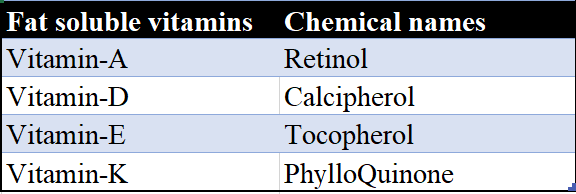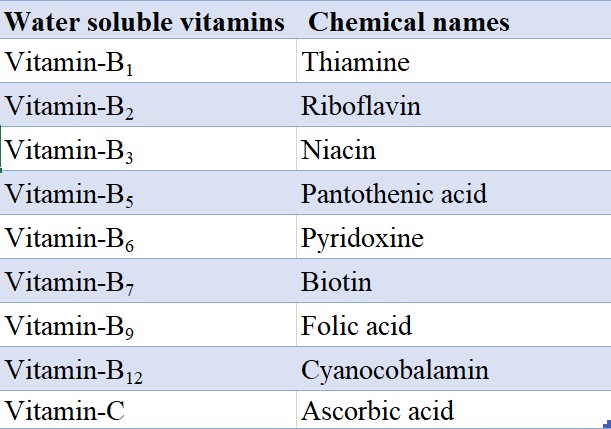What are Vitamins
The human body requires essential nutrients and organic substances that were present in natural foods in minute amounts. Vitamins are a group of organic molecules required by the body for normal growth and maintenance.
Adequate eating of fruits, veggies, and dairy products and exposure to sunlight may help to maintain vitamin sustainability in the body also helps to develop good metabolism and reduce aging in humans.
Why Should we Need Vitamins?
A vitamin is an organic compound required by an organism. It cannot be synthesizer in sufficient quantities in our body and obtained by the available food sources we eat.
You have probably heard at least one of these sayings “don’t forget to take you are vitamins. Vitamins do not directly serve as a source of energy but they aid the enzymes as co factors to generate energy from the sources like proteins carbohydrates and fats.
Do you know your vitamin History?
The discovery of vitamins was a major scientific achievement in health and diseases in 19 century. In 1912 Casimir funk originally coined the term vitamin” vital stands for life and amine is the organic compound from rice polishing. In the 20th century scientists were able to isolate various vitamins found in foods.
Read Also: Health Benefits of Triphala
Role of Vitamins
The group of vitamins plays a really big part in eyesight. When you eat foods that contain both fat and water-soluble vitamins stored in your tissues and liver they are used by the special carriers and are involved in making red blood cell formation oxygen supply to the body organs boosting our immune system, important in metabolic pathways, tissues, and bone formation, in addition, they are important for keeping the human body healthy and active
Purpose of vitamins
When you eat vitamins from plants and animals they can be broken down by heat acid or air absorbed by the body tissues and leads to the fruitful generation of energy which enables us to perform our routine activities.
Therefore it is our prime importance of taking kind of vitamins that may help to overcome diseases and infections. This mini-article provides a detailed overview of a variety of vitamins, classifications, and functions.
Read also: Home Remedies to Get Rid of Cellulite
Classification of vitamins
There are different types of vitamins. On the basis of solubility we can classify vitamins into 2 categories they are lipid-soluble and tend to be stored in the body in moderate amounts are called as
- Fat-soluble vitamins that are included A, D, E & K
Most vitamins dissolve in water they are not easily stored in the body and get flushed out by the urine when consumed in excess are called as
- Water-soluble vitamins that included the B complex of vitamins (B1,B2,B3,B5,B6,B7,B9,B12.) AND Vitamin-C
Vitamins and Their Chemical Names


Health Benefits of Vitamins
Fat-soluble vitamins & functions
- Vitamin-A: It gives a good vision of healthy skin bone and tooth growth and maintains immune system health.
- Vitamin-D: Helps the body absorbs calcium and stored in bones teeth
- Vitamin-E: Helps maintain cell structure act as an antioxidant protects cell membranes, and protects the skin from damage & allergies.
- Vitamin-K: Needed for blood clotting and help to stop bleeding from the wounds.
Read Also: Health Benefits of Chyawanprash
Water-soluble vitamins & function
- Vitamin-B1: producing energy from carbohydrates, proper nerve function promoting growth, and good muscle tone.
- Vitamin-B2: it is important for normal vision and skin; it is part of an enzyme needed for metabolism.
- Vitamin-B3: it helps in digestion, important for the nervous system.
- Vitamin-B5: part of an enzyme needed for energy metabolism.
- Vitamin-B6: It helps to make red blood cells, maintains protein metabolism
- Vitamin-B7: It is part of an enzyme helps to maintain DNA, plays a role in the metabolism of fatty acids, and amino acids.
- Vitamin-B9: it is a part of an enzyme, important for cell division.
- Vitamin-B12: Necessary for red blood cells and proper nervous, and brain function.
- Vitamin-C: it acts as good anti-oxidant important for the immune system and aids in iron absorption.
Read Also: Importance of Vitamin B12 in the human body
Conclusion
Our ancestors have probably needed vitamins for billions of years in the form of fruits; vegetables. With the rise of agriculture people began to eat more wheat and corn plants as their regular menu stuff.
And they will generally provide a sufficient supply of vitamins a better variety of food protects, could reduce vitamin deficiencies. Understanding the evolutionary biology of vitamins can help researchers make new medicines for organisms.



